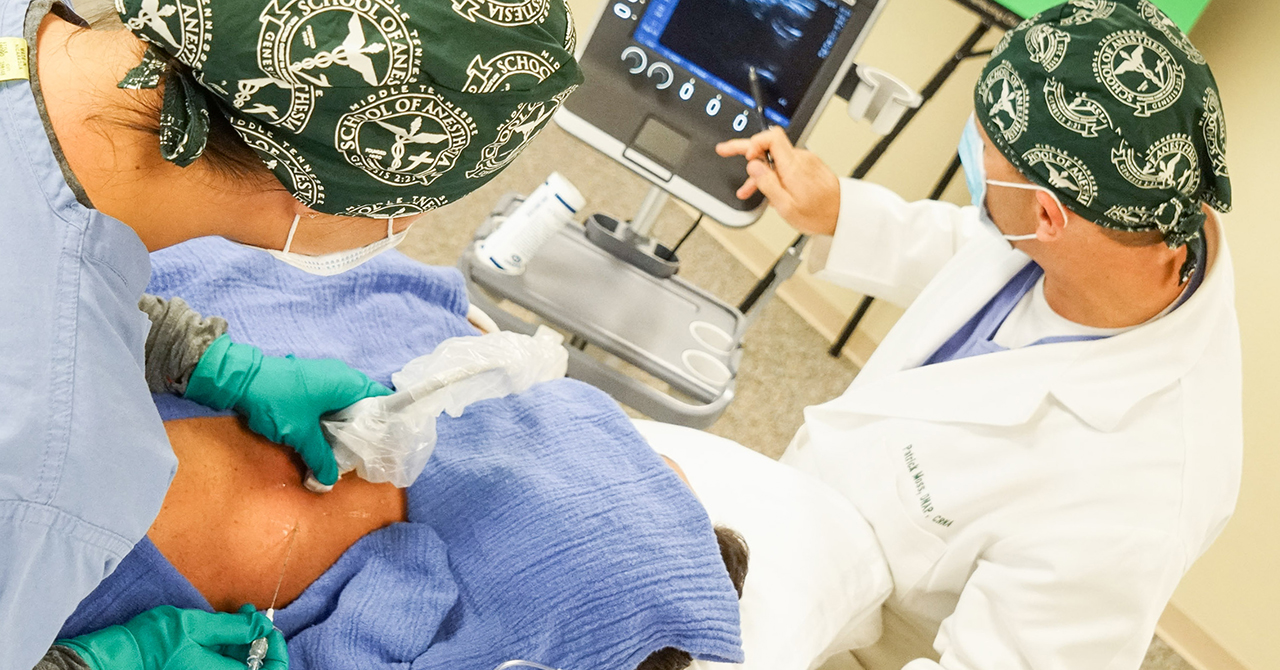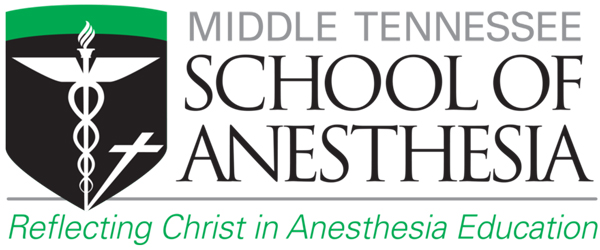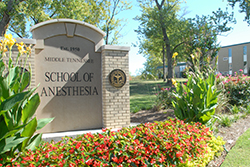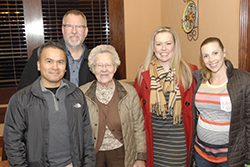
MTSA announces postgraduate fellowship for acute surgical pain management
September 9, 2016
Middle Tennessee School of Anesthesia is stepping up efforts to better educate nurse anesthetists on surgical pain treatment options that can shorten recovery time and offer more effective ways of managing perioperative care.
MTSA and the American Association of Nurse Anesthetists (AANA) have partnered to offer a postgraduate Acute Surgical Pain Management Fellowship (ASPMF) beginning summer 2017. Both organizations unveiled details at the AANA’s National Congress in Washington, D.C., on Sept. 11.
“We continue to see a growing demand among nurse anesthetists for a better approach to acute surgical pain management,” said Dr. Chris Hulin, President of MTSA. “There are new technologies and advanced intervention techniques that didn’t exist just a few years ago. We felt it was critical to offer a highly specialized program for our students, many of whom have extensive experience and want to stay on the cutting edge of the field. The Acute Surgical Pain Management Fellowship enables them to do that.”
In addition, the Fellowship addresses the growing call to offer anesthesia-based surgical pain treatment options as an alternative to prescription opioids, which continue to be a critical concern among healthcare providers nationwide.
More information about the ASPMF is available at www.mtsa.edu/fellowship.
NOTE TO MEDIA: Please refer to the following joint announcement for additional information.
Partnership with Middle Tennessee School of Anesthesia Offers Acute Surgical Pain Management Fellowship in 2017
PARK RIDGE, Ill.—Middle Tennessee School of Anesthesia (MTSA) and the American Association of Nurse Anesthetists (AANA) have partnered to offer a postgraduate Acute Surgical Pain Management Fellowship (ASPMF) beginning summer 2017 through the graduate school located in Madison, Tennessee. The objective of this new certificate program, a component of the AANA Pain Management Curriculum, is to advance the knowledge and skills of Certified Registered Nurse Anesthetists (CRNAs) in acute surgical pain management and prepare them to help meet the growing need for this evidence-based approach in the United States.
CRNAs = Part of the Solution to a Growing Need
The field of pain management is continually growing. As the baby boom generation ages, increasing numbers of patients will undergo surgery, and CRNAs will be responsible for managing these patients’ acute pain. The AANA/MTSA Acute Surgical Pain Management Fellowship will equip CRNAs with the necessary knowledge and skill-sets to meet this growing demand. From medical management approaches, such as multimodal therapies and opioid sparing strategies, to advanced interventional techniques, including continuous catheter utilization, CRNAs will acquire the knowledge to treat these patients with confidence and skill.
The Program Process
The ASPMF consists of a classroom component offered via distance education (didactic education) and a clinical component (proctored hands-on clinical experience offered through one or more clinical sites). Fellows will learn innovative techniques including multimodal and interventional therapies to manage acute surgical pain, while developing business management proficiency.
Topics of study include:
- Legal, ethical, and professional issues related to acute surgical pain management
- Psychosocial, spiritual, and cultural dimensions of acute surgical pain
- Non-allopathic considerations for acute surgical pain management
- Physiological aspects of pain
- Assessment and evaluation of the patient with acute surgical pain
- Pharmacogenetics, dynamics, and kinetics related to acute surgical pain management
- Technical interventions for the management of acute pain
- Foundations of initiating an acute pain service
- Business fundamentals in acute pain management
Admission Requirements
To be admitted, a prospective fellow must be a CRNA with an active, unencumbered license. Completion of a basic and advanced-cadaveric ultrasound-guided regional anesthesia workshop is required prior to enrollment in the program. Watch the AANA website and Anesthesia E-ssential for announcements and registration details; visit the AANA Pain Management Webpage: www.aana.com/resources2/practicemanagement/Pages/Pain-Management.aspx.
About Middle Tennessee School of Anesthesia
Founded in 1950, Middle Tennessee School of Anesthesia (MTSA) provides graduate-level education and training of nurse anesthetists in a Christian environment born of its Seventh-day Adventist heritage. MTSA is the only independent, fully accredited anesthesia institution of its kind in the nation, instilling excellence through innovative and diverse clinical experience. A leader in academic, clinical, and professional distinction, MTSA is responsive to the needs of its constituents, providing affordable graduate education for students from diverse backgrounds. The campus is located in Madison, Tennessee, a suburb of Nashville.
Middle Tennessee School of Anesthesia provides a highly specialized academic environment, integrating the latest research, hands-on clinical practice, and one-on-one support in a unique graduate education setting. Its reputation for excellence attracts student nurse anesthetists who are motivated to improve patient outcomes and serve others through their profession. Visit the Middle Tennessee School of Anesthesia at www.mtsa.edu.
About the American Association of Nurse Anesthetists
Founded in 1931 and located in Park Ridge, Ill., the AANA is the professional organization for more than 49,000 nurse anesthetists across the United States. As anesthesia specialists, Certified Registered Nurse Anesthetists (CRNAs) safely provide approximately 40 million anesthetics to patients each year for surgical, obstetrical, pain management, and trauma stabilization services. CRNAs deliver essential healthcare in thousands of communities and are able to prevent gaps in access to anesthesia services, especially in rural, inner-city, and other medically underserved areas of the country. They are highly valued in today’s healthcare environment because they deliver the same safe, high-quality anesthesia care as other anesthesia professionals but at a lower cost, helping to control rising healthcare costs. Additional information about the AANA and CRNAs is available at www.aana.com and www.aana.com/future-today.
# # #
MEDIA CONTACT:
Jeff Krinks, Prufrock Communications
jeff@prufrockcommunications.com
(615) 478-0267








